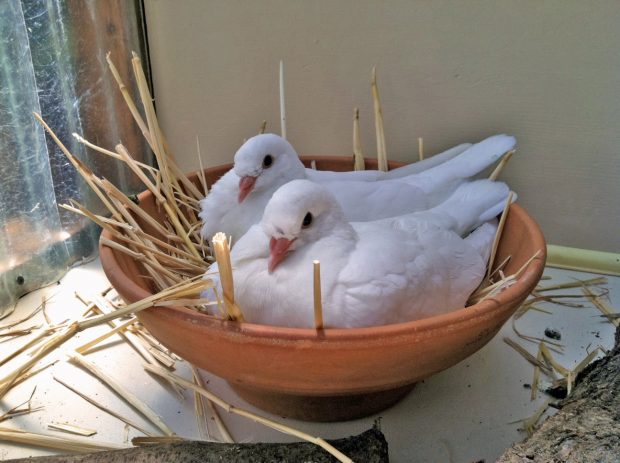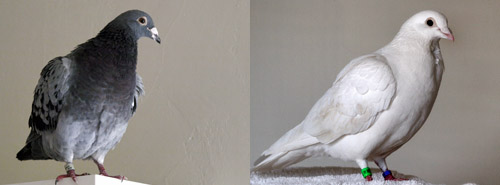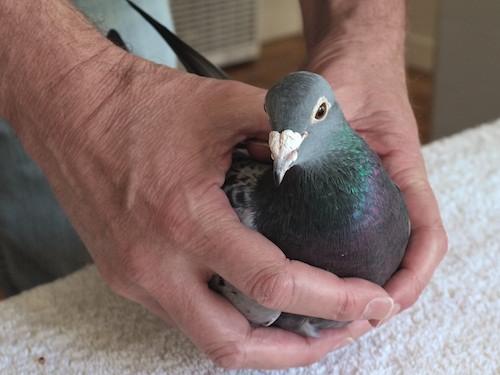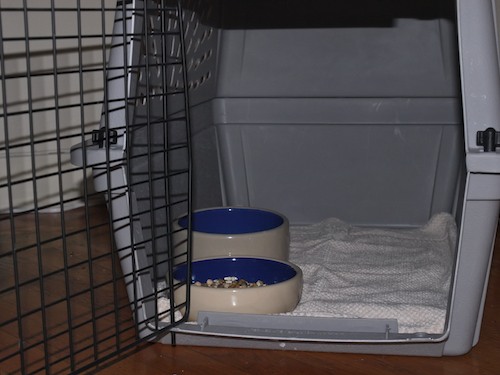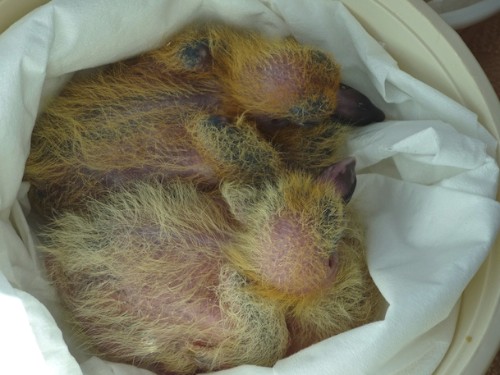What to Do if a Pigeon (or Dove) Needs Help
The information on this page will help you determine whether or not a pigeon needs your help and, if so, what you should do. If you have found a pigeon that is clearly in distress, skip to Urgent Pigeon Care, below. See map of pigeon friendly rescues here. And Facebook is a great place to find pigeon-friendly help. Join our Palomacy Group and post your photos, location and situation for assistance.
A pigeon needs your help if . . .
It is hanging around persistently and seems to be asking for help. If so, it’s probably a domestic — or injured — bird that needs capture and care.
It cannot fly. A pigeon without flight cannot survive in the wild. It should be caught and cared for. (See instructions below.)
It is injured. Whether it is domestic or wild, an injured pigeon needs proper medical care.
It is a fancy pigeon or a white King pigeon or “dove release” survivor. King pigeons are large domestic pigeons — usually pure white or mostly white — that cannot fly well or fend for themselves in the wild. They face certain death if not rescued. “Dove release” birds (including trained but lost white Homers as well as the DIY-released white Ringneck doves and King pigeons need rescue! (See Why “Dove Releases” Are Cruel)
See Types of Pigeons for help identifying the pigeon you have found.
A pigeon MAY need your help if . . .
It has a numbered band. Banded pigeons are often registered racing or homing pigeons, but they can also be pets. A healthy, banded homing pigeon may have successfully joined a wild flock. But if the banded pigeon does not seem to be well or thriving, she needs help. (Learn more about pigeon racing here.)
How to (gently!) capture a lost or injured pigeon
You do not have to be afraid of handling pigeons. They don’t bite and are harmless. (And your catching the pigeon is much less dangerous to the bird than a predator will be.) It is extremely rare for a human to get sick from a pigeon. You’re much more likely to get sick from a dog or cat. Or be struck by lightning. (See The Urban Wildlife Society for a list of quotes from experts on the pigeon health issue.)
1) If possible, have a box or pet carrier ready, lined with a soft cloth or paper towels. If you are in a situation where carrying a box is not possible, you can temporarily transport a pigeon safely in a paper grocery bag folder over or clipped at the top.
2) See How to Catch a Pigeon for lots of info or capture the pigeon using one of the following strategies:
- If the pigeon is badly injured or very tame, you may be able to pick it up. Always handle the bird gently, grabbing it across the back and both wings, with both hands.
- If you can’t easily pick up the pigeon, but you can get close, you may be able to throw a towel or jacket over the bird to restrain it before placing it in the box.
- If you can’t get close, try using food to tempt or lure the pigeon into a carrier, crate, box, or a shed or garage in which it will be much easier to catch.
- Another option is to walk behind it slowly and herd it through an open door inside where it can be more easily cornered and caught.
- In some situations, you may be able to use a net, provided it is large enough to capture the pigeon.
- If you have trouble helping the pigeon, seek help at Palomacy’s Help Group or the Pigeon Talk website. Or contact your local animal shelter for assistance.
Urgent pigeon care
If the bird is gasping, shaking (seizures, tremors), bleeding or vomiting, take it to an avian veterinarian immediately.
1. Get the pigeon into a safe, warm enclosure. Place it gently in a box, cage or pet carrier with a soft cloth or paper towels on the bottom.
2. If the pigeon is feral, contact a local wildlife hospital or rehabilitator that takes wild pigeons. For help or advice in Northern California, call WildCare at (415) 456-SAVE (7283).
Be sure to ask about the hospital’s policy toward feral pigeons before you relinquish the animal. Hospitals that take only native animals will generally have few options but to euthanize the pigeon. Facilities that take wild pigeons will euthanize if they determine that the pigeon will not be able to survive in the wild after rehabilitation. If the facility has a policy of euthanasia, you may want to care for the bird yourself. Pigeons adjust extremely well to life as a pet. It is legal to keep a pet pigeon and they are easy to care for. You can find local expert help by posting at Palomacy’s Help Group or at Pigeon Talk. Also, see How to Care for a Rescued Pigeon for more information.
3. If the injured pigeon is domestic, take it to a local avian veterinarian or humane society that treats pigeons. Or, post your information at the Palomacy Help Group or the Pigeon Talk website in the “I Found a Pigeon or Dove” section, where a variety of pigeon experts can guide you in your next steps. (Palomacy Pigeon & Dove Adoption directly serves San Francisco and the Bay Area and counsels on out of the area rescues.)
4. If the bird can stand properly and hold its head upright, place a crock with water in the enclosure. Choose a crock or dish heavy enough that the pigeon can’t tip it. Do not give water if the bird is having trouble with balance or standing, since the pigeon may not be able to lift its head properly out of the water dish.
5. Place a shallow dish of bird seed in the box or carrier. (Most supermarkets sell wild bird seed or parakeet food — either of which will work as pigeon food in an emergency. Pigeon food is usually sold at feed stores rather than pet stores and so can be hard to find.)
If you find an injured or orphaned baby pigeon . . .
1. Place the baby in a dark, warm and quiet place. You can use a ventilated box, cushioned with soft cloth or paper towels on the bottom. Turn a heating pad on LOW and place the box half on, half off the heat. It’s important that the bird can move away from the heat if it gets too warm. (See Providing Heat for an Orphaned Bird.)
In a pinch, you can transport a baby bird safely in a paper lunch bag or grocery bag (clipped at the top with a clothespin). Paper bags allow air to pass through, and can provide very short-term shelter until you get the bird to its next location. If you have a paper towel or a soft cloth, place that on the bottom of the bag for the bird’s comfort.
2. Find a wildlife rehabilitator or get some advice immediately in forums like Palomacy’s Help Group. Baby birds require specific diets. Feeding them the wrong food or feeding them incorrectly can result in injury or death. Unless you get proper instruction on how to feed a baby bird, there is a danger that the baby may aspirate food — that is, accidentally take food into it’s lungs instead of the crop.
3. If you cannot get your pigeon to a wildlife hospital or rehabilitator please call a wildlife hospital hotline for advice on how to care for the baby until you can get some help. (The WildCare Hotline is available 24 hours a day/365 days a year if you leave a message at (415) 456-SAVE (7283).) You can also post at Palomacy’s Help Group or Pigeon Talk for help.
If you find a juvenile feral or wild pigeon or dove that can be rehabbed and released, it is much kinder and more humane to help that bird get the expert rehab and release it needs than to keep it yourself. It is never okay to take a wild bird and make it captive when it could live free. There are already far too many domestic and unreleasable pigeons and doves (and other birds as well) in need of forever homes! All too often MickaCoo Pigeon & Dove Rescue is contacted by someone who, after a couple of months or years caring for their found baby pigeon, no longer wants it but, now tame, it can no longer be released. Wild birds should live free!

